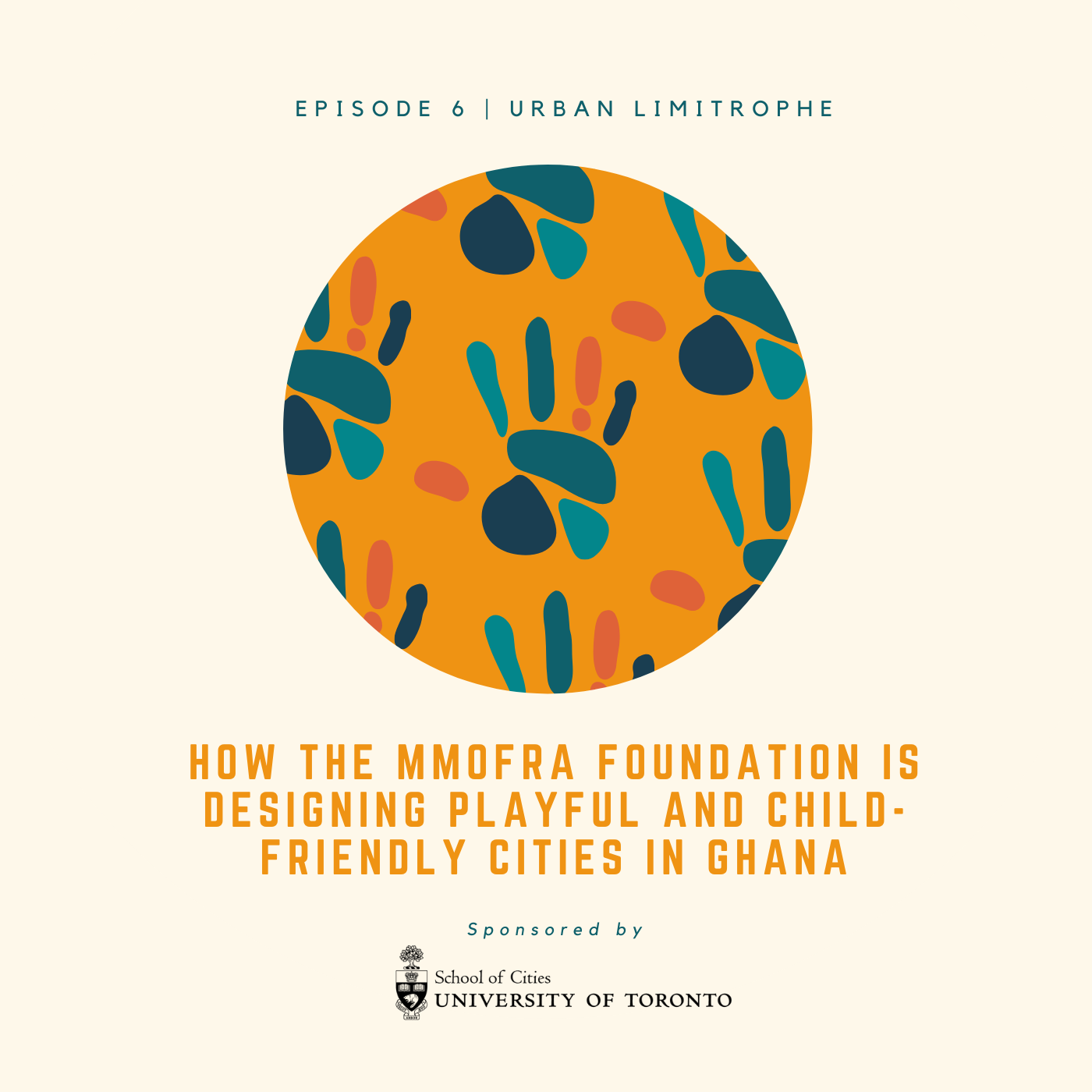In this episode, I discuss urban play spaces and child-friendly cities with Amowi Phillips from the Mmofra Foundation. The Mmofra Foundation is a non-profit based out of Accra, Ghana that transforms urban spaces and urban green spaces into creative labs where children and youth can play and learn while being exposed to art, culture, and nature.
In this episode, you'll learn about:
- how the organization uses creative placemaking and urban design to transform their Mmofra Place Park into an outdoor play and learning lab,
- the highlights and challenges of implementing play spaces in Accra's marketplaces,
- what a child-friendly/youth-friendly space looks,
- how the Mmofra Foundation is collaborating with other play experts across the continent to develop an Africa Play Network,
- and much more!
Powered by RedCircle
This episode is sponsored by the University of Toronto School of Cities. The School of Cities "convenes urban-focused researchers, educators, students, practitioners and the general public to explore and address complex urban challenges, with the aim of making cities and urban regions more sustainable, prosperous, inclusive and just". To learn more about their work visit www.schoolofcities.utoronto.ca.
Guest: Amowi Phillips
Connect with the Mmofra Foundation
- Instagram: @mmofrafoundation
- Facebook: facebook.com/mmofra.foundation
- Twitter: @mmofra_ghana
- LinkedIn: linkedin.com/company/mmofra-foundation/
- Learn more about Mmofra Foundation with these links:
Timestamps
- 08:04 | Introduction to the Mmofra Foundation and about Efua T. Sutherland's work and legacy
- 10:30 | What is the Playtime in Africa Initiative?
- 16:50 | The challenges that they had to overcome in implementing play spaces in parks and how they're turning the Mmofra Place Park into a learning lab.
- 24:59 | How they've integrating local materials and the ancient game of Mancala into the design of the park and turned them into a learning tool for youth.
- 28:39 | How they're using the park to reconnect visiting youth with their culture to instill cultural pride and confidence.
- 35:07 | Why Amowi considers the Mmofra Place Park to be an outdoor children's museum, and how the park's play features take accessibility and modularity into account.
- 40:30 | What is the Playable Markets Initiative?
- 46:40 | The key lessons learned from implementing the Playable Markets Initiative.
- 53:22 | What kind of services do you think cities (i.e. partnerships or policies) that could be put in place to help the Mmofra Foundation replicate this project in other markets in Accra?
- 57.41 | Why designing the city with children and youth in mind in Africa is so critical
- 58:46 | What does a child-friendly or youth-friendly city look like to Amowi, and the development of the Africa Play Network
- 1:07:11 | What’s next for the Mmofra Foundation?
- 1:12:46 | How can people get involved with the Mmofra Foundation?
Show Notes
- Why safe playgrounds aren't great for kids video
- Playtime in Africa Initiative
- Playtime in Africa by Efua T. Sutherland and Willis Bell digital flip-through
- STEPS Public Art
- Playable Markets Initiative
- ImagiNation Afrika
- The Playground Hub
- Play Africa
- Play Action International
- Urban Play Framework
- Real Play Coalition
Want to learn more? Check out this episode's references!
ARUP. (2017, December). Cities alive: Designing for urban childhoods. ARUP. Retrieved from https://www.arup.com/perspectives/publications/research/section/cities-alive-designing-for-urban-childhoods
Brown, C., de Lannoy, A., McCracken, D., Gill, T., Grant, M., Wright, H., & Williams, S. (2019) Special issue: child-friendly cities, Cities & Health, 3(1-2), 1-7. doi: 10.1080/23748834.2019.1682836
Brussoni, M., Olsen, L. L., Pike, I., & Sleet, D.A. (2012). Risky play and children’s safety: Balancing priorities for optimal child development. International Journal of Environmental Research and Public Health, 9(9), 3134–3148. doi: 10.3390/ijerph9093134
Child in the City. (2018, October 16). Why play is important in urban development. Child in the city. Retrieved from https://www.childinthecity.org/2018/10/16/why-play-is-important-in-urban-development/?gdpr=accept
Frost, J. (2012). Evolution of American playgrounds. Scholarpedia, 7(12). doi:10.4249/scholarpedia.30423
Haubursin, C. [Vox]. (2019, February 20) Why safe playgrounds aren't great for kids [Video]. YouTube. https://www.youtube.com/watch?v=lztEnBFN5zU
Kellock, P. (2015). The case for play. Playground Ideas. Retrieved from https://playgroundideas.org/caseforplay/
Mmofra Foundation. (n.d.). About us. Mmofra Foundation. Retrieved from https://mmofraghana.org/about/
Play Africa. (n.d.). About Play Africa. Play Africa. Retrieved from https://playafrica.org.za/about-play-africa/
Playground Ideas. (n.d.). Infographic: The power of play [Infographic]. Playground Ideas. Retrieved from https://playgroundideas.org/download-infographic/?doifd_download_id=1
Save the Children. (n.d.). UN convention on the rights of the child (UNCRC): An international agreement for child rights. Save the Children. Retrieved from https://www.savethechildren.org.uk/what-we-do/childrens-rights/united-nations-convention-of-the-rights-of-the-child
The Editors of Encyclopaedia Britannica. (2021, June 23). Efua Sutherland. Encyclopedia Britannica. Retrieved from https://www.britannica.com/biography/Efua-Sutherland
UNHCR. (1989). Convention on the rights of the child. UNHCR. Retrieved from https://www.unhcr.org/uk/4d9474b49.pdf
Stay in the loop!
If you would like to be interviewed, have an interesting idea to share for an episode, or have any feedback on the podcast, please send me an email at hello[at]urbanlimitrophe.com.
If you enjoy the show, please share it with your family, friends, gym instructor, gardener, graphic designer... and leave a review on Apple Podcasts!
Make sure to subscribe to the newsletter and follow the podcast on Instagram to stay in the loop
 |
| Like it? Pin it! Share it! |


No comments:
Post a Comment